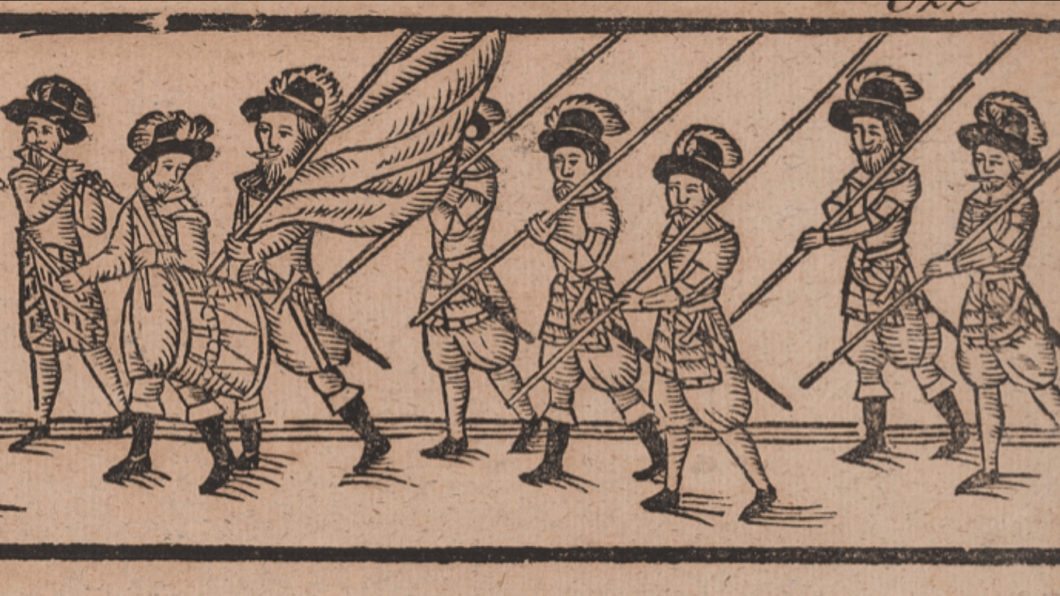
Marketing Empire: Military and Companionate Marriage Recruitment in Broadside Ballads Presentation at SCSECS 2020
I presented the above slides and below script are the slides at the South Central Society for Eighteenth Century Studies (SCSECS) 2020 Conference in St. Augustine, Florida, February 8 at 8:30 a.m. Conference theme: The Speedy Enlightenment: Moving, Racing, Quickening, and Otherwise Accelerating the Long Eighteenth Century. Panel: “Cheap Print: Chapbooks, Ballads, News, Scandal, and Inexpensive Ephemera.” Chair: Stacey Jocoy, Texas Tech University.
Presentation script
Good morning, thank you for being here this morning, and thank you to Dr. Stacey Jocoy for accepting me onto this panel.
As Stacey just said I’m Kelly Plante and I am currently the Project Manager for the Warrior Women Project, a soon-to-be-published online digital humanities project at Wayne State in collaboration with the Early English Broadside Ballad Archive (henceforth referred to as EBBA), which made possible the research I am presenting today on military and companionate marriage recruitment in early english broadside ballads.
I am indebted to Dr. Simone Chess—who was approached by EBBA to create a digital home for 113 “Warrior Women” ballads originally catalogued by Professor Dianne Dugaw for the index of her 1982 dissertation, The Female Warrior Heroine in Anglo-American Balladry—; and my colleagues at Wayne State who have engaged in diligent data entry, analysis, ballad transcription and aggregation and scholarly and contextual content creation for the site; EBBA; Dr. Dianne Dugaw, whose historic catalogue we are digitizing; the Bodleian’s Broadside Ballads Online (BBO), Eighteenth Century Collections Online (ECCO), Early English Books Online (EEBO), and the English Short-Title Catalogue (ESTC), for images and information regarding these ballads under Creative Commons.
Before presenting my paper I will contextualize it within the Warrior Women digital humanities project of which it is a part. I want to briefly describe the way the paper will ultimately be part of a larger whole, where it can be accessed, how we are creating it and how (future) users can create with/in it, and when it will launch.
The Warrior Women Project is a collaborative experiment: Through a graduate course and a directed study, Dr. Chess has led us in a de-centered fashion through this collaborative experiment in inventing what that digital project would look like. We are building a digital home for the 113 warrior women ballads originally catalogued by Dugaw; the site also publishes Dugaw’s index as a searchable research tool and historical record in its own right, capitalizing on the digitization and rampant scanning of broadside ballads that has occurred since her original research.
We are developing our own digital critical edition of the 113 warrior women ballads, with background and critical essays that contextualize and analyze the ballads, their history, and their significance in their own moment and our own.
Designing with the end in mind, we have a project management philosophy of decisions made by consensus and have used Google Drive, Docs, and Sheets, and WordPress from the “back end” for content management.
Though Professor Dugaw published her dissertation research in her monograph Warrior Women and Popular Balladry: 1650-1850 (Cambridge University Press, 1989; reprinted by Chicago University Press, 1996), her typewritten catalogue of ballads was never published or archived. This project digitizes Dugaw’s index, preserving it as both a searchable research tool and a historical record in its own right.
We further build on Dugaw’s original catalogue with our own database of the ballads, which enables them to be mapped, sorted, and searched in new ways including by 45 categories, and 40 tags.
Some of the categories include “overnight visit/shared bed,” “returns to feminine dress,” “lover disapproves”; some tags include keywords that frequently appear in the ballads such as “maiden,” “captain,” “hands,” “cheeks,” “lips,” “fair.”
The catalogue’s 113 ballads externally link to other online iterations, especially on the English Broadside Ballad Archive (EBBA), Early English Books Online (EEBO) and Eighteenth Century Collections Online (ECCO), as well as its listing in the English Short Title Catalogue (ESTC).
If you’d like to access the site early we would truly appreciate your feedback and input! Please take one of these handouts with site URL, login and contact information for me and Dr. Chess.
In my remaining time, I would like to share some of my own research, that was enabled by the WWP database and the availability of the Dugaw catalogue. The project is called “Marketing Empire: Military and Companionate Marriage Recruitment in Early English, ‘Warrior Women’ Broadside Ballads.”
[Visit s.wayne.edu/warriorwomen which will go live in winter semester 2020, to read my full critical essay.]












